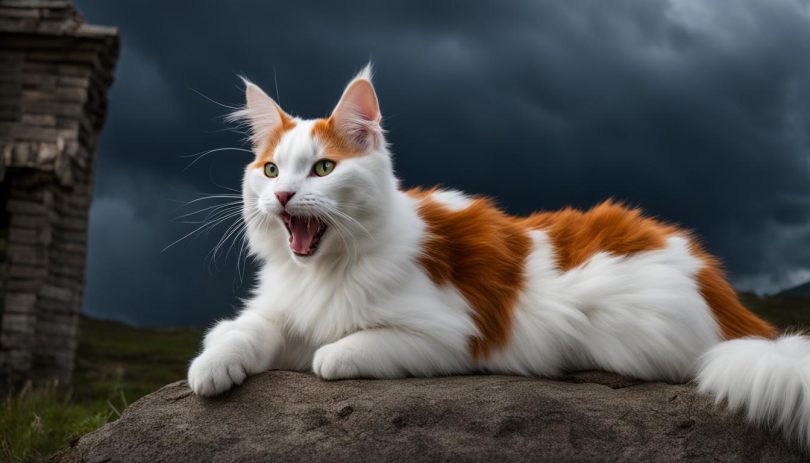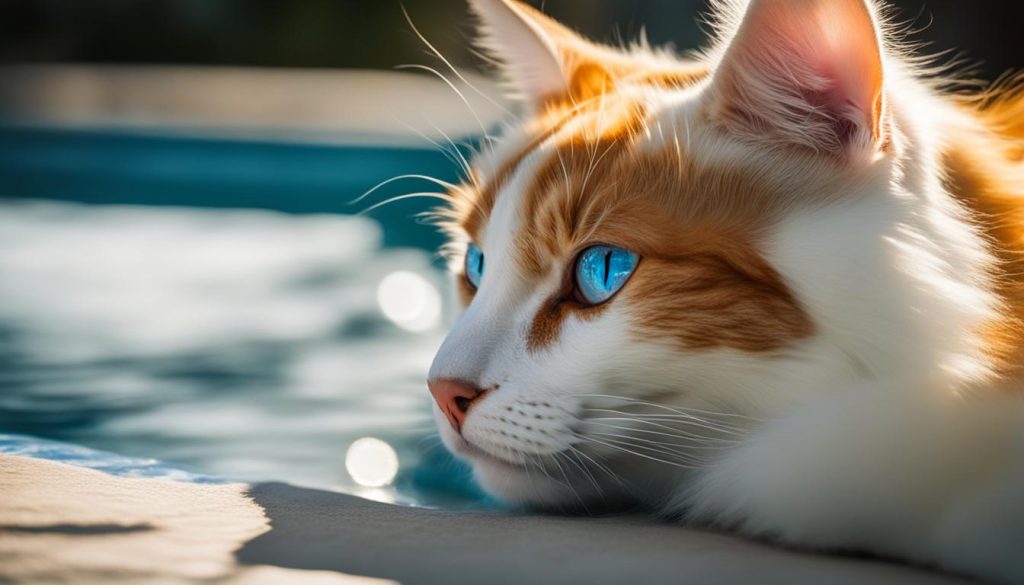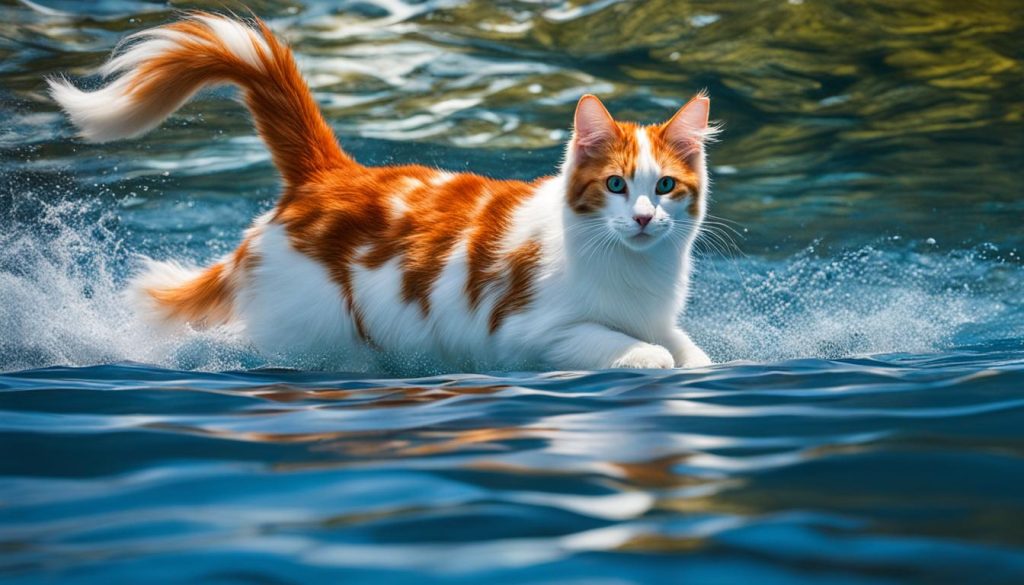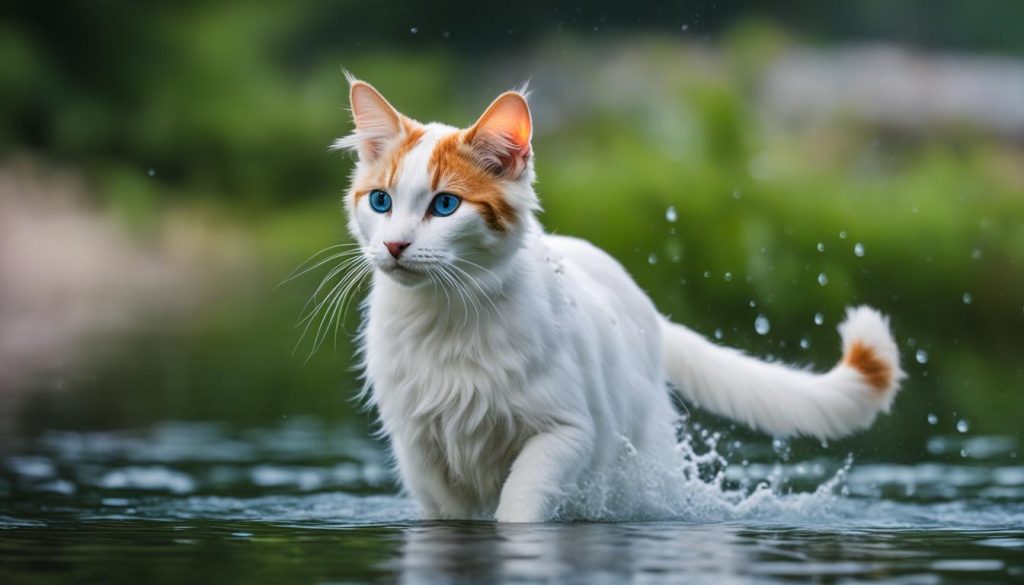Greetings, fellow feline enthusiasts! Today, I want to delve into the fascinating world of Turkish Van cats and unravel the truth behind their reputation for aggression. Are these majestic creatures truly aggressive, or is their behavior simply misunderstood? Join me as we explore the intriguing behavior and temperament of Turkish Van cats.
Before we dive in, it’s important to note that not all Turkish Van cats are aggressive. While some studies suggest they may display more aggression compared to other breeds, we must remember that individual cats can vary greatly in their behavior and responses to different stimuli. It’s crucial to approach their behavior with an open mind and avoid generalizations.
Key Takeaways:
- Turkish Van cats are often associated with aggression, but not all cats of this breed exhibit such behavior.
- Individual traits and experiences play a significant role in a Turkish Van cat’s behavior.
- Avoid generalizations and approach each cat as a unique individual.
- Professional help from a veterinarian or animal behaviorist can assist in managing and addressing aggression if needed.
- Proper understanding, socialization, and responsible ownership are key to a harmonious relationship with Turkish Van cats.
The Personality Traits of Turkish Van Cats
When it comes to understanding the Turkish Van breed, it’s important to explore their unique personality traits and temperament. While Turkish Vans have been identified as scoring higher on aggression towards humans and lower on sociability towards cats, it’s crucial to remember that these traits can vary among individual cats. Let’s take a closer look at the key personality and behavioral traits of Turkish Van cats:
- Playfulness: Turkish Vans are known for their playful nature and enjoy interactive play sessions with their owners.
- Fearfulness: Like any other cat breed, Turkish Vans can exhibit fearfulness in certain situations or when introduced to new environments.
- Aggression towards humans: While Turkish Vans may score higher on aggression towards humans, it’s important to note that this trait is not representative of all cats in the breed.
- Sociability towards humans: Turkish Vans can display varying levels of sociability towards humans, with some cats being more affectionate and others more independent.
- Sociability towards cats: Turkish Vans may score lower in sociability towards cats, indicating that they may prefer a more solitary lifestyle.
- Litter box issues: Like other cats, Turkish Vans may experience litter box issues if their litter box is not properly maintained or if they are stressed.
- Excessive grooming: Some Turkish Vans may engage in excessive grooming, which can be influenced by factors such as stress or anxiety.
It’s important to note that while these traits provide general insights into the behavior of Turkish Van cats, each cat is an individual and should be evaluated on a case-by-case basis. Understanding the unique personality traits of Turkish Vans can contribute to better care and enrichment for these beautiful feline companions.
Care for your Turkish Van cat
To ensure the well-being of your Turkish Van cat and manage their personality traits effectively, there are several key factors to consider:
- Socialization: Early and consistent socialization is essential for Turkish Van cats. Expose them to various people, animals, and environments from a young age to help them develop positive associations and reduce the likelihood of aggression.
- Enrichment: Provide your Turkish Van cat with plenty of mental and physical stimulation to prevent boredom and destructive behavior. Offer interactive toys, puzzle feeders, and engage in regular playtime sessions to channel their energy in a positive way.
- Proper training: Utilize positive reinforcement techniques to train your Turkish Van cat. Reward good behavior and redirect any aggressive tendencies. Seek guidance from a professional animal behaviorist if necessary.
- Regular veterinary care: Schedule routine check-ups with your veterinarian to monitor your Turkish Van cat’s overall health and address any potential issues early on.
- Safe environment: Create a secure and stimulating environment for your Turkish Van cat. Ensure they have access to hiding spots, scratching posts, and a comfortable resting area.
By understanding the personality traits of Turkish Van cats and providing them with the care they need, you can foster a harmonious and fulfilling relationship with your feline companion.
Turkish Van Cat Behavior and Aggression
Turkish Van cats are known for their striking appearance and unique personality traits. While they can be affectionate and playful, some individuals may display aggression. Understanding their behavior and knowing how to manage aggression is crucial for a harmonious relationship with your Turkish Van cat.
Aggression in Turkish Van cats can stem from various factors, including genetics, socialization, and environmental influences. It’s important to monitor your cat for signs of aggression, such as hissing, growling, or swatting. If you notice these behaviors, it’s essential to address them promptly to prevent escalation.
Dealing with Turkish Van aggression requires a multifaceted approach. First, ensure that your cat has a safe and enriched environment. Provide plenty of toys, scratching posts, and perches to satisfy their natural instincts. Regular play sessions can help them expend excess energy and reduce the likelihood of aggressive behavior.
Additionally, seek professional help from a veterinarian or animal behaviorist who specializes in feline behavior. They can assess your cat’s aggression and provide tailored recommendations for managing and controlling it. Behavior modification techniques, such as positive reinforcement training, may be recommended to redirect your cat’s behavior towards more desirable actions.
| Signs of Aggression | Management Tips |
|---|---|
| Hissing, growling, or swatting | Provide a calm and low-stress environment |
| Body posture indicating aggression (e.g., arched back, dilated pupils) | Ensure regular exercise and mental stimulation |
| Unprovoked attacks towards humans or other pets | Consult with a veterinarian or animal behaviorist |
| Resource guarding behaviors | Implement a consistent feeding and play schedule |
Remember, aggression in Turkish Van cats can be managed and controlled with patience, understanding, and professional guidance. With the right approach, you can help your cat overcome aggression and foster a loving and harmonious bond.
The Unique Characteristics of Turkish Van Cats
Turkish Van cats possess a set of distinctive characteristics that make them stand out among other breeds. One of the most notable features of Turkish Vans is their unique coat pattern known as the Van pattern. This pattern is characterized by colored fur only on the head and tail, while the rest of the body is pure white. It creates a striking and beautiful contrast that sets them apart from other cats.
Another fascinating trait of Turkish Van cats is their ability to swim. Unlike most cats, Turkish Vans are not afraid of water and may even enjoy taking a dip. Their love for water is believed to stem from their historical proximity to Lake Van in Turkey, where they were exposed to water from an early age. This exceptional swimming ability makes them truly unique among feline companions.
“Turkish Van cats are known for their distinctive coat pattern and their ability to swim.”
Aside from their physical attributes, Turkish Van cats are also renowned for their energetic and playful nature. They are highly intelligent and require mental and physical stimulation to thrive. Providing stimulating toys, interactive play sessions, and puzzle feeders can help keep them mentally engaged and prevent boredom, which can sometimes lead to behavioral issues, including aggression. By channeling their energy in positive ways, owners can help promote their well-being and minimize any potential aggressive tendencies that may arise.
The Unique Characteristics of Turkish Van Cats at a Glance:
- Distinctive coat pattern known as the Van pattern
- Ability to swim
- Energetic and playful nature
Embracing and appreciating the unique characteristics of Turkish Van cats can deepen our understanding of this remarkable breed. By providing them with the care, stimulation, and love they need, we can create a harmonious and fulfilling bond with these special feline companions.
The History and Origins of Turkish Van Cats
Turkish Van cats have a fascinating history and origin that adds to their allure. These unique felines originated in Southeast Turkey, specifically in the region surrounding Lake Van. They have been domesticated for centuries and have become cherished pets around the world. The Turkish Van breed was first introduced to the Western world in 1955 when a pair of Van cats named ‘Antalya’ and ‘Ankara’ were brought to England. Their striking appearance and distinctive behavior quickly captivated cat enthusiasts, leading to the recognition and popularity of the Turkish Van breed.
The Turkish Van’s origins near Lake Van have influenced their behavior and characteristics, particularly their affinity for water. Unlike many other cat breeds, Turkish Vans are not afraid to engage with water and may even enjoy swimming. This unique behavior is believed to have developed due to their historical proximity to the lake, where they would have been exposed to water from an early age. It’s important to note that not all Turkish Van cats exhibit this behavior, as individual personality traits can vary.
“Turkish Van cats have a fascinating history and origin that adds to their allure.”
Throughout their history, Turkish Van cats have been treasured by the Turkish people for their exceptional character and unique coloring. They are known for their striking coat pattern called the Van pattern, where the color is limited to the head and tail while the rest of the body is white. This distinct coat pattern sets them apart from other breeds and adds to their overall appeal. While some may associate aggressive tendencies with the breed, it’s important to view aggression as an individual trait and not generalize it for the entire Turkish Van breed. Each cat has its own personality and should be treated and assessed accordingly.
| Turkish Van Cat Characteristics | Description |
|---|---|
| Origin | Southeast Turkey, near Lake Van |
| Distinct Coat Pattern | Van pattern: color on the head and tail, white body |
| Swimming Ability | Some Turkish Vans enjoy swimming |
In conclusion, the history and origin of Turkish Van cats contribute to their unique personality and appearance. Their connection to Lake Van, their striking coat pattern, and their ability to swim are just some of the distinct traits that make them stand out among other cat breeds. While aggression in Turkish Vans can occur in some individuals, it’s important to remember that each cat is an individual and should be treated and assessed accordingly. Understanding the history and characteristics of Turkish Van cats can help cat owners appreciate and enjoy these fascinating felines.
Caring for Turkish Van Cats and Addressing Aggression
When it comes to caring for Turkish Van cats and addressing aggression, it’s important to create a nurturing environment that meets their needs. Socialization plays a crucial role in shaping their behavior, so exposing them to different people, animals, and environments from an early age can help reduce the likelihood of aggression. Regular playtime is also important to provide them with an outlet for their energy and prevent boredom, which can contribute to aggressive behavior.
Additionally, seeking professional help from a veterinarian or animal behaviorist can be beneficial in managing and controlling aggression in Turkish Van cats. They can provide expert guidance on identifying triggers and implementing behavior modification techniques. It’s important to remember that aggression in cats can have various underlying causes, including medical issues, so ruling out any underlying health problems is essential.
Creating a structured routine for feeding, play, and rest can also help manage aggression. Providing interactive toys and puzzle feeders can engage their natural hunting instincts and mental stimulation. Additionally, ensuring that they have a safe and secure space where they can retreat and feel calm is important for their overall well-being.
Table: Tips for Caring for Turkish Van Cats and Addressing Aggression
| Tip | Description |
|---|---|
| 1 | Ensure proper socialization from an early age |
| 2 | Provide regular playtime and stimulation |
| 3 | Seek professional help from a veterinarian or behaviorist |
| 4 | Establish a structured routine for feeding, play, and rest |
| 5 | Provide interactive toys and puzzle feeders |
| 6 | Create a safe and secure space for the cat |
Turkish Van Cat Personality and Playfulness
Turkish Van cats are known for their lively and playful nature. They possess an inherent curiosity and have a knack for engaging their owners in interactive play. As an owner of a Turkish Van cat, I’ve witnessed firsthand their love for playtime and their ability to entertain themselves for hours on end.
These feline companions enjoy a wide range of play activities, from chasing after toys to pouncing on moving objects. It’s important to provide them with stimulating toys that cater to their natural hunting instincts, such as feather wands or puzzle feeders. This not only helps keep them physically active but also mentally stimulated, preventing boredom that can sometimes lead to unwanted behaviors.
One of the unique traits of Turkish Van cats is their affinity for water. While not all Turkish Vans may enjoy swimming, many have a fascination with water and may even join their owners in the bath or shower. This playful interaction with water adds an extra element of excitement and fun to their personality.
Quotes:
“My Turkish Van cat constantly surprises me with her playful antics. She has a favorite toy mouse that she loves to chase around the house. It’s truly entertaining to watch her leap and pounce, showing off her athleticism and agility.”
“Playing with my Turkish Van cat has become a bonding experience for us. I love watching her excitement and enthusiasm as she swats at a feather wand or chases after a laser pointer. It’s a joy to see her happy and engaged in playtime.”
List of Playtime Activities:
- Chasing after feather wands
- Pouncing on moving objects
- Batting at balls or small toys
- Playing hide-and-seek with treats or toys
- Engaging with puzzle feeders or treat-dispensing toys
- Exploring paper bags or cardboard boxes
Table: Comparison of Turkish Van Cat Personality Traits
| Personality Trait | Turkish Van Cats | Other Cat Breeds |
|---|---|---|
| Playfulness | High | Varies |
| Fearfulness | Low | Varies |
| Aggression towards humans | Varies | Varies |
| Sociability towards humans | Varies | Varies |
| Sociability towards cats | Varies | Varies |
| Litter box issues | Low | Varies |
| Excessive grooming | Varies | Varies |
The Importance of Socialization and Training for Turkish Van Cats
Socialization plays a crucial role in shaping the behavior and temperament of Turkish Van cats. Early exposure to different people, animals, and environments can help them develop positive associations and reduce the likelihood of aggression. It is important to introduce your Turkish Van cat to a variety of experiences in a safe and controlled manner. This can include meeting new people, interacting with other animals, and experiencing different sounds, sights, and smells.
Training is equally important in managing and controlling aggression in Turkish Van cats. Positive reinforcement techniques, such as rewarding good behavior with treats or praise, can be highly effective. It is essential to establish consistent boundaries and rules for your cat. This can be achieved through reward-based training methods, where desired behaviors are encouraged and undesirable behaviors are redirected or ignored.
Remember that each Turkish Van cat is an individual with unique needs and behaviors. It is essential to tailor socialization and training techniques to suit the personality and temperament of your cat. Consistency, patience, and understanding are key in fostering a positive and well-behaved Turkish Van cat.
Benefits of Socialization and Training for Turkish Van Cats
- Promotes positive behavior: Socialization and training help Turkish Van cats learn appropriate ways to interact with people, animals, and their environment. This encourages positive behavior and reduces the likelihood of aggression.
- Enhances bonding: Through socialization and training, you can strengthen the bond with your Turkish Van cat. Spending quality time together and engaging in positive activities fosters trust and creates a deeper connection.
- Prevents problem behaviors: Socialization and training can prevent or minimize problem behaviors such as aggression, fearfulness, and destructive tendencies. By providing a structured and enriching environment, you can redirect your Turkish Van cat’s energy towards appropriate outlets.
- Improves overall well-being: A well-socialized and trained Turkish Van cat is more likely to be confident, content, and happy. They are less likely to exhibit stress-related behaviors and enjoy a higher quality of life.
Conclusion
Socialization and training are essential for Turkish Van cats to thrive and lead a balanced life. By introducing them to various experiences and teaching them appropriate behaviors, you can help prevent aggression and promote positive interactions. Remember to be patient, consistent, and reward-based in your approach, as each cat is unique and may require different strategies. With proper socialization and training, your Turkish Van cat can become a well-adjusted and loving companion.
Tips for Owning a Turkish Van Cat
If you’re considering owning a Turkish Van cat, it’s important to understand their behavior and how to control aggression. These beautiful and unique cats require responsible pet ownership and a nurturing environment. Here are some tips to help you provide the best care for your Turkish Van:
1. Provide a Safe and Stimulating Environment
Creating a safe and stimulating environment is crucial for the well-being of your Turkish Van cat. Ensure that your home is free from any potential hazards or dangers. Provide plenty of toys, scratching posts, and climbing structures to keep them mentally and physically engaged. Interactive toys and puzzle feeders can also help stimulate their intelligence and prevent boredom.
2. Regular Veterinary Care
Regular veterinary care is essential to keep your Turkish Van cat healthy and prevent any potential health issues. Schedule regular check-ups with your veterinarian to monitor their overall health, vaccinations, and preventive care such as flea and tick control. Establishing a good relationship with a trusted veterinarian can provide you with valuable guidance and support.
3. Proper Nutrition
Feeding your Turkish Van cat a balanced and nutritious diet is vital for their overall well-being. Consult with your veterinarian to determine the appropriate type and amount of food for your cat’s age, size, and activity level. Remember to provide fresh water at all times and avoid overfeeding to maintain a healthy weight.
4. Addressing Aggression
If you notice any signs of aggression in your Turkish Van cat, it’s important to address it promptly. Consult with a veterinarian or animal behaviorist to identify possible triggers and develop strategies to manage the aggression. Positive reinforcement training techniques can be effective in redirecting your cat’s behavior and promoting positive interactions.
Remember, every Turkish Van cat is unique, and their behavior may vary. By providing a loving and stimulating environment, along with proper socialization and training, you can help your Turkish Van cat thrive and minimize any potential aggression.
Conclusion
After examining the behavior and temperament of Turkish Van cats, it is clear that they can exhibit varying degrees of aggression. While the breed has certain tendencies that may be associated with aggression, it is important to remember that each cat is an individual and should be treated and assessed accordingly.
Responsible ownership, including providing a safe and stimulating environment, regular socialization, and proper training, can help manage and control any aggressive tendencies in Turkish Van cats. It is crucial to address any signs of aggression promptly and seek professional help if needed.
Remember, Turkish Van cats are cherished for their exceptional character and unique coloring. They are highly intelligent, playful, and have a natural curiosity. With the right care and attention, these beautiful cats can thrive and bring joy to their owners.
FAQ
Are Turkish Van cats aggressive?
Some Turkish Van cats may exhibit aggressive behavior, but it is important to remember that each cat is an individual and should not be generalized. Aggression in cats can be influenced by various factors and should be addressed and managed on an individual basis.
What are the key personality traits of Turkish Van cats?
Researchers have identified seven key personality and behavioral traits in cats, including playfulness, fearfulness, aggression towards humans, sociability towards humans, sociability towards cats, litter box issues, and excessive grooming. These traits can vary among individual Turkish Van cats.
How can I handle aggression in Turkish Van cats?
If you observe aggression in your Turkish Van cat, it is important to seek professional help. Consult with a veterinarian or an animal behaviorist who can provide guidance on how to address and manage the aggression in a safe and effective manner.
What are the unique characteristics of Turkish Van cats?
Turkish Van cats have a distinctive coat pattern called the Van pattern, where the color is restricted to the head and tail while the rest of the body is white. They are also known for their ability to swim, which is uncommon among cats.
Where do Turkish Van cats originate from?
Turkish Van cats originated in Southeast Turkey and were brought to England in 1955. They have a long history of being cherished by the Turks for their exceptional character and unique coloring.
How can I care for a Turkish Van cat and address aggression?
Providing a nurturing and enriching environment, proper socialization, regular playtime, and seeking professional help are important aspects of caring for a Turkish Van cat and addressing aggression if it arises.
Why are Turkish Van cats known for their interaction with water?
Turkish Van cats have a historical proximity to Lake Van in Turkey, where they were exposed to water from an early age. This is believed to be the reason why they have a unique affinity for water and may enjoy swimming.
Are Turkish Van cats playful?
Yes, Turkish Van cats are highly intelligent and playful. They have a natural curiosity and enjoy engaging in interactive play with their owners. Providing them with stimulating toys and interactive play sessions can help channel their energy and prevent boredom.
How important is socialization and training for Turkish Van cats?
Socialization plays a crucial role in shaping the behavior and temperament of Turkish Van cats. Early exposure to different people, animals, and environments can help them develop positive associations and reduce the likelihood of aggression. Training using positive reinforcement techniques can also be effective in teaching them appropriate behavior.
What are some tips for owning a Turkish Van cat?
Owning a Turkish Van cat requires responsible pet ownership. Providing a safe and stimulating environment, regular veterinary care, proper nutrition, and plenty of mental and physical stimulation are essential for their overall well-being. It is also important to address any signs of aggression promptly and seek professional help if needed.









